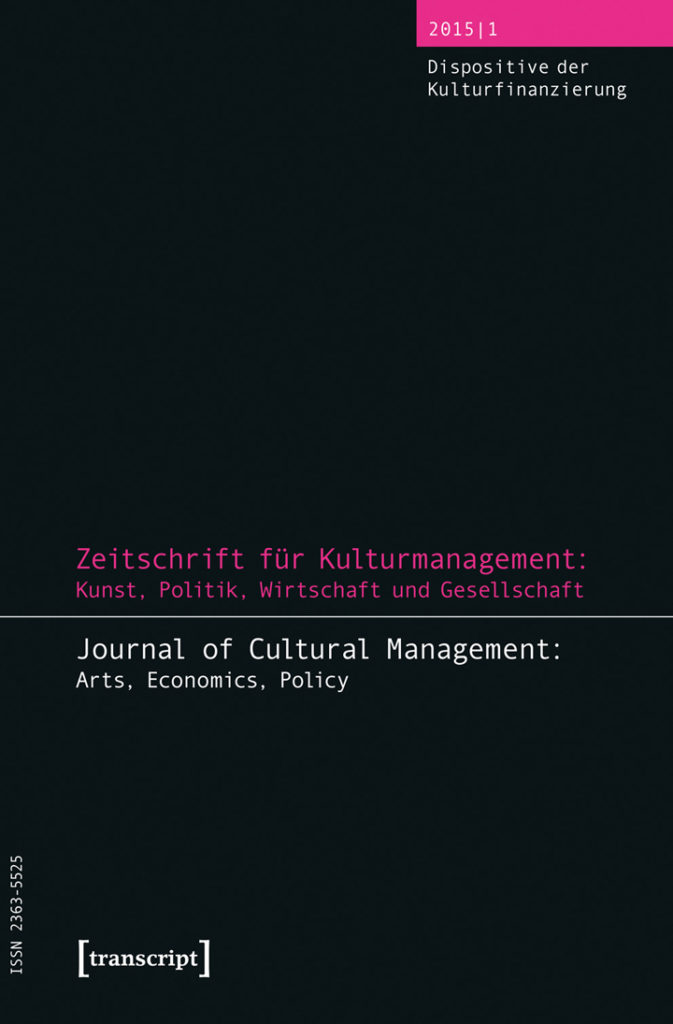Research Article
The Income Standard for the Performing and Visual Arts in the Netherlands
A Simple Indicator of Financial Performance or a Transition to Another Mode of Supporting Non-profit Organizations?
Abstract
Probably the most prevalent indicator of the financial performance of non profit arts organizations is their ability to attract private funding. Therefore, the Dutch government introduced the so-called ‘income standard’. In this contribution, we explore the income standard as a mechanism to leverage private support for the arts and discuss some of its implications. Not only may the income standard – which is based on a matching principle – be a precursor of a different mode of financing non-profits in Europe; it may also raise conflicts with other organizational and policy goals, and as such jeopardize the non-profit form of organizing the arts.
Keywords
2015 (1)
Dispositive der Kulturfinanzierung

Related Articles
Wirkung und Qualität kombiniert
Ein Qualitätsmanagementsystem für TheaterJournal of Cultural Management 2017 (1)
Research Article
Kann ich hier mitmachen?
Kulturproduktion und -rezeption im Kontext von ErwerbsarbeitsweltYearbook for Culture Management 2012
Essay
Yearbook for Culture Management 2013
Research Article
Journal of Cultural Management and Cultural Policy
Research Article
Yearbook for Culture Management 2013
Research Article
Crisis of succession: On the institutionalization of charismatic rule in German theatre
Journal of Cultural Management 2019 (2)
Research Article
© 2025, Journal of Cultural Management and Cultural Policy
Keywords
- Aesthetics
- Higher Education
- Cultural Diplomacy and Foreign Cultural Policy
- Occupation
- Career and Professional Role
- Audience Development
- Audience Studies and Visitor Studies
- Visitor Motivations
- Business
- Covid Pandemic
- Democracy
- Digitalization
- Diversity
- Third Sector
- Empirical Aesthetics
- Development
- Ethics
- Evaluation
- Field Theory
- Festival
- Film
- Federalism
- Community Arts
- Societal Change
- Ideology
- Staging
- Career
- Communication
- Concert
- Creative Industries
- Creativity
- Crisis
- Culture
- arts organizations, cultural organizations
- Cultural Participation
- Cultural Change
- Fincancing The Arts
- Cultural Promotion Law
- Cultural History
- Cultural Management
- Cultural Economy
- Cultural Organizations
- Art Education
- Cultural Policy
- Cultural Production
- Cultural Sociology
- Art Education
- Cultural Understanding
- Arts Administration
- Cultural Industry
- Cultural Sciences
- Art
- Art Field
- Arts Research
- Artists
- Artistic Research
- Artistic Reputation
- Arts Management
- Arts Organizations
- Art education
- Arts Marketing
- Arts Administration
- Curating
- Leadership
- Literature
- Advocacy
- Management
- Marketing
- Market
- Media
- Methods Development
- Mexico
- Monumentalizing
- Museum
- Music
- Non-Visitor Studies
- Opera
- Orchestra
- Organization
- Political Expression
- Post-truth Politics
- Professional Role
- Audience
- Audience Development
- Law
- Government
- Role
- Socially Engaged Art
- Social Cohesion
- Social Change
- Social Cohesion
- Non-visitor Socio-demographics
- Socioculture
- State
- Symbolic capital
- Dance
- Participatory Justice
- Theatre
- Theatre Governance
- Theory Development
- Tourism
- Transformation
- Survey
- Entrepreneurship
- Urbanism
- Civil Society


